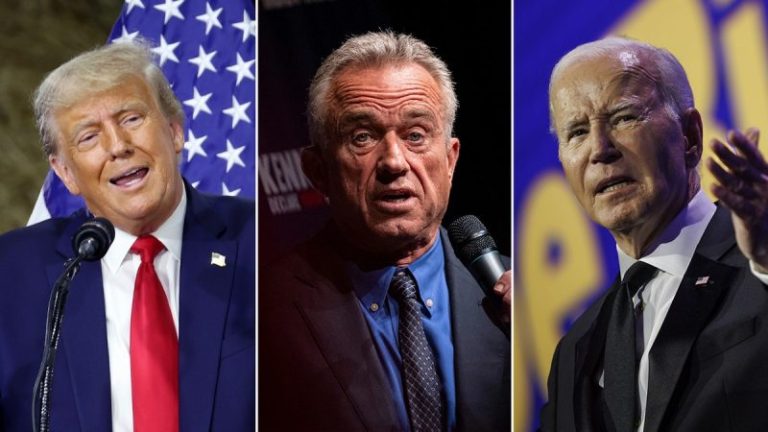Democrats and Republicans alike are scrambling to define Robert F. Kennedy Jr.’s independent presidential bid and ascribe his views to the other ideological side before he is able to introduce himself to the 2024 electorate.
‘The only thing they know is that he’s Robert Kennedy’s son,’ said Allan Lichtman, a historian and distinguished professor of history at American University.
As Kennedy focuses on gaining ballot access, his election travel looks much different than that of former President Trump or President Biden, who are primarily campaigning in critical battleground states.
Despite this advantage, both parties are still looking to undermine Kennedy’s outside attempt.
Trump took to his Truth Social to slam Kennedy on Wednesday, calling him ‘the most Radical Left Candidate in the race, by far.’
The Democratic National Committee has claimed that Kennedy is ‘a Trump stalking horse’ in the 2024 election.
Earlier this month, the DNC established a staff devoted specifically to addressing third-party competitors. According to spokesperson Matt Corridoni, the decision to take on outside presidential bids was born out of not taking anything for granted.
‘I think a lot of his support is simply based on the name, not on any understanding of what RFK Jr. actually stands for,’ Lichtman claimed, calling him a ‘very ambiguous figure.’
One reason for his enigmatic status is that ‘he seems to legitimately hold opinions that one can attribute to both the left and the right,’ according to Kyle Kondik, managing editor of Sabato’s Crystal Ball at the University of Virginia Center for Politics.
For Russell Verney, who served as a top adviser to Ross Perot’s famed 1992 independent presidential campaign, these efforts from each side were prompted by both parties’ aversions to competition.
If a voter chooses to support Kennedy on Election Day, Verney claimed many of them ‘wouldn’t have voted for Biden anyway.’
According to Democratic strategist Kaivan Shroff, it wouldn’t be hard for Democrats ‘to paint him like a Disney villain, the black sheep of a historic American family, who has this wild vendetta against the Democratic Party his family helped build.’
Republican strategists estimated a much larger threat presented to Biden, and one that isn’t easily navigated. The combination of the president’s ‘fragile’ support and the Kennedy name’s Democratic legacy ‘will cost a boatload of money and a smart plan’ for Biden to combat, said GOP strategist Zack Roday.
‘If I was in the Biden camp right now, I would be pulling the five-alarm fire,’ added Charlie Kirk, founder and CEO of Turning Point USA.
Others suggest that the threat presented by Kennedy is ‘asymmetrical.’
‘There are expected to be a lot of ‘double-haters’ in this contest’ unhappy with both Trump and Biden, added Kevin Madden, former senior adviser to Utah Sen. Mitt Romney’s presidential campaigns in 2008 and 2012.
In a statement to Fox News Digital, Kennedy press secretary Stefanie Spear claimed that the attacks from both sides were prompted by ‘a genuine inability’ to understand ‘a candidate who does not fit into conventional political categories.’
‘Our ticket represents the broad majority who have unsubscribed from the right-left paradigm,’ she said of Kennedy and his running mate Nicole Shanahan.
While the campaign expressed confidence in its coalition, Lichtman said historically, ‘the partisans come home’ on Election Day.
This is the result of ‘wasted vote syndrome,’ he explained. ‘You know, ‘We love you, Ross Perot, but you can’t win, so I’m not going to vote for you.”
Verney agreed that this syndrome is often what leads to a roughly 50% cut in voter percentage for independent candidates on Election Day compared to their previous stature in polling. According to the former Perot adviser, using the idea of a wasted vote is an incredibly effective strategy to undercut an independent bid.
Jacob Neiheisel, associate professor of political science at the State University of New York at Buffalo, also noted, ‘There isn’t a great deal of evidence that third-party candidates play such a role.’ He added that third-party voters are more likely to sit out voting if their candidate isn’t an option.
According to Bernard Tamas, an associate political science professor at Valdosta State University and author of ‘The Demise and Rebirth of American Third Parties,’ Kennedy’s messaging is neither consistent nor cohesive, presenting a challenge to delivering voters come Election Day. ‘The issues that he supports may galvanize certain voters early on,’ he explained, but may put them off later.
The image of Kennedy projected to voters will ultimately come down to which side employs the most effective communicators, according to Lichtman. And right now, Biden seems to have an advantage with figures like former presidents Bill Clinton and Barack Obama on his side.
In a statement, Trump spokesperson Steven Cheung reiterated Trump’s claims about Kennedy, calling him a ‘radical leftist.’
The Biden campaign did not provide comment and instead referred Fox News Digital to the DNC’s third-party operation.

